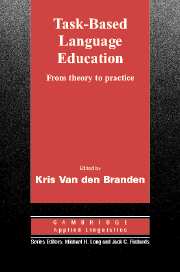Book contents
- Frontmatter
- Contents
- Acknowledgements
- Series Editors' Preface
- Chapter 1 Introduction: Task-based language teaching in a nutshell
- Chapter 2 From needs to tasks: Language learning needs in a task-based approach
- Chapter 3 Tasks for absolute beginners and beyond: Developing and sequencing tasks at basic proficiency levels
- Chapter 4 Developing language tasks for primary and secondary education
- Chapter 5 Task-based language teaching in science education and vocational training
- Chapter 6 Task-based language teaching and ICT: Developing and assessing interactive multimedia for task-based language teaching
- Chapter 7 Developing and introducing task-based language tests
- Chapter 8 The role of the teacher in task-based language teaching
- Chapter 9 A box full of feelings: Promoting infants' second language acquisition all day long
- Chapter 10 Training teachers: Task-based as well?
- References
- Subject Index
- Name Index
Chapter 10 - Training teachers: Task-based as well?
Published online by Cambridge University Press: 05 May 2010
- Frontmatter
- Contents
- Acknowledgements
- Series Editors' Preface
- Chapter 1 Introduction: Task-based language teaching in a nutshell
- Chapter 2 From needs to tasks: Language learning needs in a task-based approach
- Chapter 3 Tasks for absolute beginners and beyond: Developing and sequencing tasks at basic proficiency levels
- Chapter 4 Developing language tasks for primary and secondary education
- Chapter 5 Task-based language teaching in science education and vocational training
- Chapter 6 Task-based language teaching and ICT: Developing and assessing interactive multimedia for task-based language teaching
- Chapter 7 Developing and introducing task-based language tests
- Chapter 8 The role of the teacher in task-based language teaching
- Chapter 9 A box full of feelings: Promoting infants' second language acquisition all day long
- Chapter 10 Training teachers: Task-based as well?
- References
- Subject Index
- Name Index
Summary
The role of the teacher in task-based language education has been described in a number of publications (e.g. Prabhu, 1987; Samuda, 2001; Willis, 1996; see also Chapters 8 and 9 in this volume). In these articles, the teacher is presented as a guide, a counsellor and a coach who tries to motivate his students to perform tasks, gives them clear instructions and supports the students' task performance, both at the cognitive and affective level, in such a way that they further develop their language proficiency. Rather than providing all the course content, delivering elaborate and explicit monologues on the structure of the language or the meaning of isolated words, the teacher tries to act as a true interactional partner, negotiating meaning and content with the students, eliciting and encouraging their output, focusing on form when appropriate and offering them a rich, relevant and communicative input.
Appealing as these ideas may look on paper, there is very little research available on how experienced teachers and student teachers perceive this particular role, on whether they are able and willing to put it into practice and on whether this particular role clashes with other roles teachers have in mind or take up in their classrooms. In this respect, the question can also be raised whether teachers or student teachers can actually be trained to teach ‘the task-based’ way?
- Type
- Chapter
- Information
- Task-Based Language EducationFrom Theory to Practice, pp. 217 - 248Publisher: Cambridge University PressPrint publication year: 2006
- 20
- Cited by

